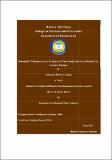| dc.contributor.author | Saleamlak, Fentaw Getahun | |
| dc.date.accessioned | 2014-09-29T14:09:34Z | |
| dc.date.available | 2014-09-29T14:09:34Z | |
| dc.date.issued | 2013 | |
| dc.identifier.citation | Saleamlak Fentaw Getahun (2013) Households’ Willingness To Pay For Improved Water Supply Services in Mekelle City, Northern Ethiopia, Thesis. Mekelle:MU. | en_GB |
| dc.identifier.uri | https://opendocs.ids.ac.uk/opendocs/handle/20.500.12413/4530 | |
| dc.description.abstract | Good quality, reliable and affordable supply of drinking water is a basic need for human life.
However, many people in LDCs are lacking this safe and quality water. Since Ethiopia is one
of these LDCs its urban and rural area population does not have access to such attributes of
water. Therefore, reliability and quality are crucial for household water supply. In this study
the CVM was used to analyze the determinants of households’ WTP for improved water
services by applying the single bounded dichotomous choice value elicitation format. The study
used cross-sectional data collected from 215 randomly selected sampled households from
Mekelle city. The CV survey responses were analyzed through descriptive and econometric
analysis using Probit and Tobit as empirical models.
The CV survey results revealed that 199 (98.51%) of the respondents were willing to pay a
positive amount for improved water services.
Thus if the proposed water improvement scheme is implemented, in addition to satisfying the
water needs of the households, the city’s utility management can collect more revenue from the
sale of improved water. The CV survey results also show that the mean WTP of households for
the proposed improved water service is between 29.60 cents and 51.51 cents per jerry can
depending on the method used.
The results from the test statistics show that sex of the respondents, Education of the
respondents, monthly income of the household, and satisfaction of the existing service
significantly affects both the probability of households’ WTP for improved water services in
the Probit model and the maximum amount they are willing to pay in the Tobit model.
Therefore, policy makers need to take in to consideration these socio-economic and
demographic factors and some other attributes of water in designing the improved water
supply system of the city. | en_GB |
| dc.language.iso | en | en_GB |
| dc.publisher | Mekelle University | en_GB |
| dc.rights.uri | http://creativecommons.org/licenses/by-nc-nd/3.0/ | en_GB |
| dc.subject | Water | en_GB |
| dc.title | Households’ Willingness To Pay For Improved Water Supply Services in Mekelle City, Northern Ethiopia | en_GB |
| dc.type | Thesis | en_GB |
| dc.rights.holder | Mekelle University | en_GB |


